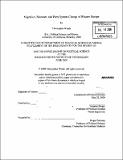| dc.contributor.advisor | Suzanne Berger. | en_US |
| dc.contributor.author | Wendt, Christopher (Christopher Kenneth) | en_US |
| dc.contributor.other | Massachusetts Institute of Technology. Dept. of Political Science. | en_US |
| dc.date.accessioned | 2010-03-25T14:58:25Z | |
| dc.date.available | 2010-03-25T14:58:25Z | |
| dc.date.copyright | 2009 | en_US |
| dc.date.issued | 2009 | en_US |
| dc.identifier.uri | http://hdl.handle.net/1721.1/53081 | |
| dc.description | Thesis (Ph. D.)--Massachusetts Institute of Technology, Dept. of Political Science, 2009. | en_US |
| dc.description | Includes bibliographical references (p. 326-352). | en_US |
| dc.description.abstract | This project explains the growth of the West European Radical Right in the late-1980s and early-1990s, using that explanation to model the growth of small, programmatically-focused ("niche") parties in previously stable party systems. I find that a key mechanism of niche party growth is the re-weighting of issue priorities or social identities generated by unanticipated, high impact events, such as a severe economic downturn, terror attack or ethnic riot. These "shocks" represent a perceived threat to the economic security, physical safety or group position of some individuals, increasing the attention (salience) they pay to a related issue or identity dimension, such as the economy, domestic security, or one's feelings of national or religious belonging. Niche parties grow when 1) the salience of the dimension they emphasizes increases and 2) the distribution of voter preferences gives them a comparative advantage if the relevant dimension is salient (the niche party is an "issue owner" on the relevant dimension). My analysis focuses on the growth of West European anti-immigrant ("nativist") parties, the major subset of the Radical Right, in the late-1980s and early- 1990s. Many countries in Western Europe were faced with unprecedented, unsolicited migration during this period, and immigration in these countries became a highly salient political issue. Nativist parties, with a popular stance on immigration, leveraged increased salience into significant electoral gains. | en_US |
| dc.description.abstract | (cont.) The continued support for nativist parties, despite declines in immigration, represents a durable (though limited) political realignment along a new, ethnic dimension of political contestation, with nativist parties championing the demands of the "native" ethnic group. To generate my hypotheses and causal mechanisms, I conducted two years of research in Germany and Austria, including an analysis of past public opinion research, a content analysis of four regional newspapers (1960-2005), 185 elite interviews (50 with nativist elites), and an analysis of nativist party literature. To test competing hypotheses I constructed a cross-national dataset of nativist support in Western Europe (1973-2006), as well as state- and local-level datasets in Germany and Austria. | en_US |
| dc.description.statementofresponsibility | by Christopher Wendt. | en_US |
| dc.format.extent | 352 p. | en_US |
| dc.language.iso | eng | en_US |
| dc.publisher | Massachusetts Institute of Technology | en_US |
| dc.rights | M.I.T. theses are protected by
copyright. They may be viewed from this source for any purpose, but
reproduction or distribution in any format is prohibited without written
permission. See provided URL for inquiries about permission. | en_US |
| dc.rights.uri | http://dspace.mit.edu/handle/1721.1/7582 | en_US |
| dc.subject | Political Science. | en_US |
| dc.title | Migration, nativism, and party system change in Western Europe | en_US |
| dc.type | Thesis | en_US |
| dc.description.degree | Ph.D. | en_US |
| dc.contributor.department | Massachusetts Institute of Technology. Department of Political Science | |
| dc.identifier.oclc | 501987882 | en_US |

